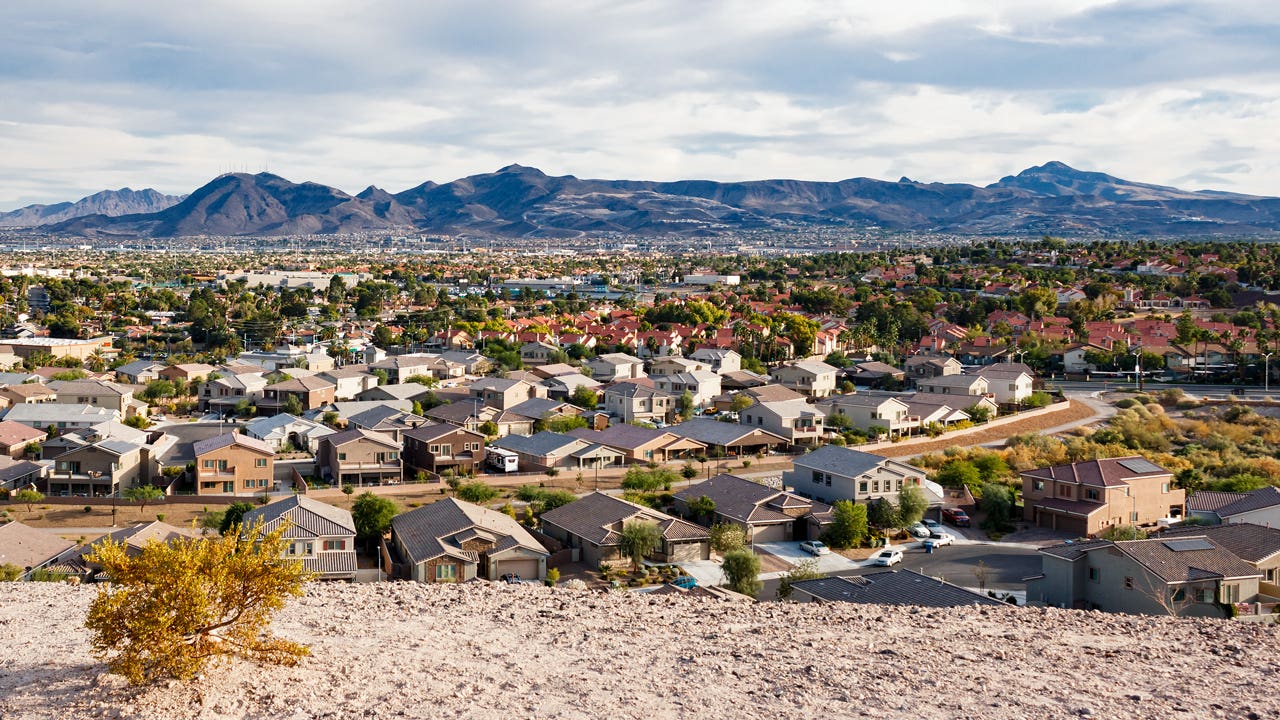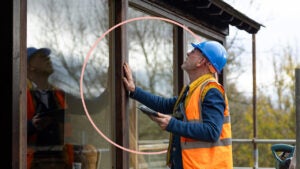Buying a house in Nevada: A how-to

If you’re hoping to buy a house in Nevada, there are plenty of reasons to feel fairly optimistic. Based on recent data from Redfin, the median sale price in the state has been on the decline since May. At the same time, the number of sellers dropping their list prices has been steadily increasing since February. Plus, there is more inventory on the market, which is always good news for buyers.
However, don’t let those numbers fool you into thinking that buying a house in the Silver State doesn’t cost a lot of green. Whether you’re looking for the bright lights of Las Vegas or a calmer pace in a city like Fernley, you’ll still need to deal with the challenges of becoming a homeowner in a time when mortgage rates are rising and housing prices cannot be classified as anywhere close to “affordable.” Read on for a comprehensive guide on how to buy a house in Nevada.
How to buy a house in Nevada
Decide where to live in Nevada
Trying to find the right place to live in Nevada starts with finding the sweet spot for your finances. If you’re on a budget, Fernley looks especially friendly right now, with a median list price just under $395,000 in October. That’s a big savings versus Reno’s median of $585,000. And if you’re looking in the Las Vegas area, you can score some big savings by shrinking your space needs: Condos and townhomes in the area have been listing for a median of $286,000 — around $200,000 cheaper than the single-family home median of $482,000.
The sticker price for a home isn’t the only expense to worry about, though. Be sure to use Bankrate’s cost of living calculator to get a sense of how much you’ll have to spend on other necessities, like transportation, food and utilities.
As you think about where you want to call home in Nevada, it’s important to look at the long-term, too. You don’t have to buy a forever home right now, but you also don’t want to move again and pay more closing costs anytime soon. Think about what’s on the horizon for the next seven to 10 years to aim for a home where you and your family can stay put for awhile.
Tips for buying a house in Nevada
What kind of house are you looking to buy in Nevada? If it’s a high-priced luxury property and you’ll need to borrow a sizable portion of the purchase price, you might wind up needing a jumbo loan, which requires excellent credit and bigger down payments. There’s a simple way to know: If you need to borrow more than $647,200, which is the conforming loan limit in every Nevada county for 2022, you will be in jumbo loan territory.
And if you’re planning to compare mortgage rates on FHA loans, your limit will be much lower. Throughout most of the state, the 2022 FHA borrowing limit is $420,680. There are higher limits in a few counties, though, including Douglas, Storey, Washoe and Carson City.
Things to know about buying a house in Nevada
- Property taxes: In addition to paying for a house, you’ll need to pay the government each year. Fortunately, property taxes are very low in Nevada compared with the rest of the country. Tax Foundation data shows the Silver State having one of the 10 lowest property tax rates in the country, with an average annual bill of $1,041 per capita.
- Dual agency: Dual agency — the practice in which a single real estate agent represents both the buyer and the seller — is legal in Nevada. It’s only permissible if both parties give written consent, though. So, if your agent asks if it’s OK, be sure to think carefully about whether you feel comfortable having them negotiate from both corners.
- Seller’s disclosure: Nevada law requires that sellers complete a property disclosure form that includes knowledge of any defects that could negatively impact its value. This should not act as a substitute for a home inspection, though — you’ll want one of those as well, to have a professional check for any potential problems or warning signs.
- Closing costs: In 2021, the average closing costs in Nevada totaled $6,383, according to data from ClosingCorp. It’s a hefty sum, but you won’t have to pay the full amount yourself. The seller is responsible for half of the transfer taxes on the sale, and the seller usually covers the cost of a title insurance policy as well.
- Attorneys: The state does not require you to pay for a real estate attorney when buying a home in Nevada. However, buying a home is a huge investment, and real estate contracts can be complex, so it’s smart to budget for the services of a legal professional to make sure your interests are covered.
- Climate and weather considerations: Despite its desert environment, flooding is a serious risk in some areas of Nevada. You’ll want to consider whether properties you’re looking at will require additional flood insurance. On the flip side, changing climate conditions are also creating a serious water shortage in parts of Nevada. This means that as a resident, you’ll likely need to follow water restriction guidelines and be prepared for the lasting impacts of a drought that is causing major challenges in the state.
How much house can I afford in Nevada?
Determining how much you can spend on a new house in Nevada requires thinking about a number of different factors: your down payment, your monthly income, other debts like student loans and credit cards and more. Bankrate’s new-home calculator can help you get a realistic understanding of what you should plan for in terms of monthly payments. And if you’re trying to figure out whether you’re a good candidate to buy, don’t forget about the additional expenses of owning a home. If your air conditioner goes kaput in the middle of an overwhelmingly hot Nevada summer, you’ll need to have enough cash to pay for a replacement ASAP.
Saving for a down payment in Nevada
The median down payment on a home in Nevada was $50,000 in the spring of 2022. However, you don’t necessarily have to be sitting on that much cash to afford a home here. With conventional loans, you’ll need to come up with at least 3 percent of the purchase price to contribute to a down payment. If that amount still feels out of reach, don’t worry: There are financial assistance programs for first-time homebuyers in Nevada and low-income borrowers. The Nevada Housing Division’s Home Is Possible program is especially valuable, because the loan — up to 4 percent of the purchase price to cover down payment and closing costs — is forgivable after three years. So, as long as you stay in your house for that 36-month period, it’s free money.
Be sure to ask your real estate agent for advice on local programs. In 15 counties, the Rural Nevada Development Corporation offers eligible buyers up to $10,000 in down payment assistance. In addition, the Nevada Rural Housing Authority’s Home At Last program provides assistance for the purchase of a primary residence, even if you’re not a first-time buyer.
Get preapproved for a mortgage
Want to show a seller that you’re a serious buyer? Getting preapproved is the easiest way to prove it. Some lenders can issue preapprovals — a preliminary indication that they are highly likely to loan you the money you need — in as little as 15 minutes with automated systems that evaluate your pay stubs, tax returns and bank account information.
Find the right lender
After you get preapproved, you’ll still need to find a lender to formally approve your mortgage application. Look at all the options, not just the company that issued your preapproval. Compare a range of lenders in Nevada to find a loan that best fits your needs. As you’re looking at different loan options, focus your attention on the APR, not just the interest rate, to get a true understanding of your costs.
Find the best local real estate agent in Nevada
Once you have a lender lined up, it’s time to add another team member to your homebuying squad. A real estate agent will listen to your needs and help you find properties that are worthy of consideration. He or she can also offer intel on the local market and help you schedule visits and attend open houses.
If you’re planning to move to Nevada from somewhere else, an agent is even more essential. Buying a house from out of state can add frustration and worry to an already-stressful process, but your agent can help you navigate the Nevada market from thousands of miles away.
Start house hunting and make an offer
When you’re ready to start actually looking at homes, you should also get ready to compromise. Unless you have a bottomless bank account, finding a home is about balancing what you absolutely must have with what you can do without. If you find a house that checks most of your boxes, are you willing to deal with a 30-minute commute? Do you really need a fourth bedroom for guests? Once you find a place that feels like a good fit, your agent can help you craft a compelling offer that captures the attention of the seller and also protects you with the appropriate contingencies.
Get a home inspection and appraisal
One of those contingencies should be a home inspection. It will cost you a few hundred bucks, but it’s well worth it to get a professional, unbiased opinion on the overall condition of the home. Review the inspection report carefully, and ask your attorney or your agent for advice on any areas of concern.
While the home inspection is technically optional, a professional appraisal will be required by your lender. An appraisal ensures the lender that the price you’re paying (with their money) is indeed an accurate market value. It’s ultimately good for you, too, to verify that you aren’t overpaying for a property.
Final walk-through and closing on your new Nevada home
Getting from your initial contract to your closing day can take a long time — around 50 days for back-and-forth negotiations, clearing the title and formally signing off on your creditworthiness as a borrower. However, don’t be in a hurry on the last lap of the race. Make sure you schedule a final walk-through to take a last look at the property before it becomes yours. This is your opportunity to double check that the seller has removed all their belongings and that nothing has been damaged in the process. It’s your job this time, not a home inspector’s, so follow this checklist to spot potential troubles.
As soon as you’re satisfied with the condition of the home, you’re ready to close. At this point, you need to be prepared to pay for your closing costs and sign a lot of documents. You’ll know how much you owe, thanks to the closing disclosure that you’ll receive at least three business days prior to your official closing. Head to the big event with a certified check or cashier’s check for the amount, and stretch out your hand for the most cursive writing you’ve done since elementary school. Sign away, and smile: You are officially a Nevada homeowner.
FAQs
-
If you’re applying for a conventional mortgage, you’ll need at least 3 percent of the purchase price for your down payment. So, if you’re aiming to buy a home that costs $300,000, you would need at least $9,000 in the bank, plus some additional money for closing costs. However, there are options if you can’t come up with that amount of cash. If you qualify for the Nevada Housing Division’s Home Is Possible program for first-time homebuyers, for example, you may be eligible for up to 4 percent of the total loan amount to help cover your down payment and closing costs.
-
For most conventional loans, you’ll need a credit score of at least 620 to qualify. But a much higher score — 740 or above — will make you eligible for the most competitive interest rates available. If you’re planning to use one of the Nevada Housing Division’s homebuyer programs, you will likely need at least a 660 credit score. If your score is low, your best bet is finding a lender that offers FHA loans. Some FHA lenders might accept a score as low as 500, but you’ll need a down payment of at least 10 percent of the purchase price.
-
Yes. The buyer and seller split the cost of real estate transfer taxes in Nevada. Throughout the entire state, the tax is $1.95 for every $500 of value, but there are additional taxes in Washoe and Churchill counties (another $0.10 for every $500) and Clark County, where an additional $0.60 for every $500 is tacked on to the sale. You’ll also have to pay property taxes on the home once it becomes yours.
Why we ask for feedback Your feedback helps us improve our content and services. It takes less than a minute to complete.
Your responses are anonymous and will only be used for improving our website.






